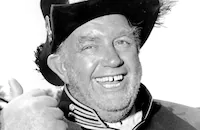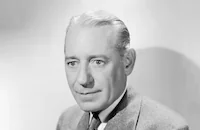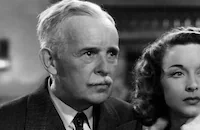Upper World

Brief Synopsis
Cast & Crew
Roy Del Ruth
Warren William
Mary Astor
Ginger Rogers
Andy Devine
Dickie Moore
Film Details
Technical Specs

Synopsis
Wealthy railroad magnate Alex Stream has little time for himself, although he is devoted to his wife Hettie and son Tommy. Hettie, however, gives first priority to her society friends, a group that Alex can't tolerate. When Alex rescues drowning showgirl Lilly Linder, he finds her cheerful ways so appealing that he relaxes long enough to eat the meal that she cooks him. One day when Hettie forgets her wedding anniversary and makes other plans, Alex, on impulse, asks Lilly to join him for dinner. From then on, Alex spends a lot of time with Lilly. Lilly's boyfriend, Lou Colima, tries to talk her into blackmailing Alex, and when she refuses because she genuinely cares for him, Lou steals Alex's letters to her. When Lou confronts him, Alex believes that Lilly was involved in the scheme from the start. He tries to grab the letters back from Lou, who shoots at him, hitting Lilly, who has thrown herself in front of Alex. Alex shoots Lou in self-defense, then tries to make it look like a murder-suicide. Alex thinks that he has escaped untouched, but Moran, a policeman who was demoted for giving a parking ticket to Alex, has seen his car parked outside the apartment and is convinced that he is the actual murderer. No one believes Moran until he manages to prove that Alex's fingerprints are on the gun. Alex is tried and acquitted. Afterward, Alex is reconciled with Hettie and the couple sails for London.

Director

Roy Del Ruth
Cast

Warren William

Mary Astor

Ginger Rogers

Andy Devine

Dickie Moore
Ferdinand Gottschalk

J. Carroll Naish

Sidney Toler

Henry O'neill
Theodore Newton

Robert Barrat
Robert Greig
Frank Sheridan

John Qualen
Willard Robertson
Nora Cecil
Lester Dorr

Wilfred Lucas
Cliff Saum
William Jeffrey
Edward Le Saint
John Elliott

Armand Kaliz
Marie Astaire
Loyce Owen
Lucille Collins
Milton Kibbee
Jay Eaton
James P. Burtis
Henry Otho
Douglas Cosgrove
Guy Usher

Clay Clement
James Durkin
Monte Vandergrift
Jack Cheatham

William B. Davidson
Edwin Stanley

Howard Hickman

Frank Conroy
Tom Mcguire
Bert Moorhouse
Sidney Degrey
Crew

Photo Collections
Videos
Movie Clip


Film Details
Technical Specs

Articles
Upper World
Rogers was third-billed in Upper World (made on loanout at Warner Bros.), after Warren William and Mary Astor. The film is a romantic melodrama about a railroad tycoon (William) neglected by his society wife (Astor). He turns to burlesque showgirl Rogers for companionship, but when her sleazy boyfriend/manager J. Carrol Naish tries to blackmail the tycoon, the romance ends tragically. While the performances by the three principals are excellent, the screenplay by Ben Markson (from a story by Ben Hecht), makes an abrupt transition from comedy-romance to thriller. The second-billed Astor is wasted in a part that's actually smaller than Rogers's, and the unlikely happy ending feels tacked on. But there are high points in Upper World, among them Rogers, in a revealing costume, performing a burlesque number, "Shake Your Powder Puff," and William's scenes with Dickie Moore, who plays his young son.
The critics, while taking note of the film's shortcomings, still found much to like in Upper World (some prints show the title as one word, Upperworld). William Boehnel of the New York World-Telegram wrote, "Upper World represents a successful triumph of acting over material. Not that its plot lines are particularly undistinguished; it is simply that they do not measure up to the standards of the acting Warren William, Mary Astor and Ginger Rogers bring to them." Katherine T. Von Blon of the Los Angeles Times singled out Rogers: "Ginger Rogers is gaily spontaneous as the revue beauty. She dances with grace and delicacy and maintains her wistful southern charm although cast in a supposedly 'hard-boiled' part."
When Astaire returned to Hollywood, he and Rogers were billed above the title for the first time in the film version of The Gay Divorce, re-titled The Gay Divorcee (1934) in deference to the new Production Code. That film was a smash, and Rogers capped a busy and successful year by marrying Lew Ayres in November of 1934. The marriage didn't last, but her partnership with Astaire did, through eight more films and a place in the pantheon of film legends. On her own, Rogers would also prove herself to be a fine dramatic actress, winning an Oscar® for Kitty Foyle (1940), showing that same beguiling combination of toughness, sassy charm, and poignancy that is already evident in Upper World.
Director: Roy Del Ruth
Screenplay: Ben Markson; Ben Hecht (story); Charles MacArthur, Eugene Walter (both uncredited, story)
Cinematography: Tony Gaudio
Art Direction: Anton Grot
Music: Bernhard Kaun (uncredited)
Film Editing: Owen Marks
Cast: Warren William (Allexander 'Alex' Stream), Mary Astor (Mrs. Hettie Stream), Ginger Rogers (Lilly Linda), Andy Devine (Oscar the Chauffeur), Dickie Moore (Tommy Stream), Ferdinand Gottschalk (Marcus), J. Carroll Naish (Lou Colima).
BW-73m.
by Margarita Landazuri














